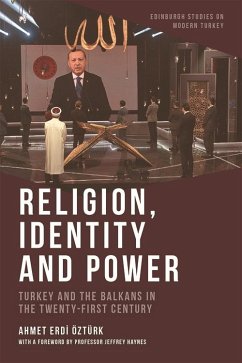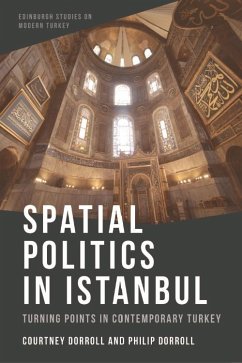
Rise of Islamic Political Movements and Parties (eBook, ePUB)
Morocco, Turkey and Jordan
Versandkostenfrei!
Sofort per Download lieferbar
16,95 €
inkl. MwSt.
Weitere Ausgaben:

PAYBACK Punkte
8 °P sammeln!
Explores the strategic decision-making of Islamic political movements in Jordan, Morocco and TurkeyAlthough regarded as a single community of Islamists, Islamic political movements utilise vastly different means to pursue their goals. This book examines why some Islamic movements facing the same socio-political structures pursue different political paths, while their counterparts in diverse contexts make similar political choices.Based on qualitative fieldwork involving personal interviews with Islamic politicians, journalists, and ideologues - conducted both before and after the Arab Spring -...
Explores the strategic decision-making of Islamic political movements in Jordan, Morocco and Turkey
Although regarded as a single community of Islamists, Islamic political movements utilise vastly different means to pursue their goals. This book examines why some Islamic movements facing the same socio-political structures pursue different political paths, while their counterparts in diverse contexts make similar political choices.
Based on qualitative fieldwork involving personal interviews with Islamic politicians, journalists, and ideologues - conducted both before and after the Arab Spring - author Esen Kirdis draws close comparisons between six Islamic movements in Jordan, Morocco and Turkey. She analyses how some Islamic movements decide to form a political party to run in elections, while their counterparts in the same country reject doing so and instead engage in political activism as a social movement through informal channels. More broadly, the study demonstrates the role of internal factors, ideological priorities and organisational needs in explaining differentiation within Islamic political movements, and discusses its effects on democratisation.
Key features
- Discusses internal debates taking place within six Islamic movements in three countries
- Compares Islamic movement behaviour across different countries and within the same country
- Compares different Islamic movement coming from diverse Islamic trends including the Muslim Brotherhood, Salafism, Sufism and Islamic parties
- Informed by qualitative fieldwork in Turkey, Morocco and Jordan, involving personal interviews with party/movement leaders and archival research on numerous party/movement documents and statements
- Develops a theory of party formation in authoritarian regimes where there are no obvious benefits to party politics
Dieser Download kann aus rechtlichen Gründen nur mit Rechnungsadresse in A, B, BG, CY, CZ, D, DK, EW, E, FIN, F, GR, HR, H, IRL, I, LT, L, LR, M, NL, PL, P, R, S, SLO, SK ausgeliefert werden.













